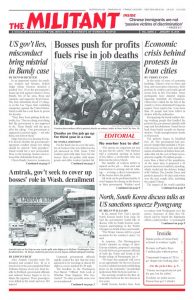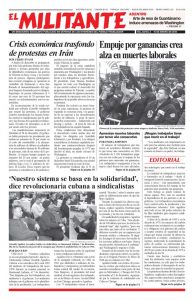EAST CHICAGO, Ind. — In the early morning hours of Dec. 11, 2017, Alfred Cadena, a 61-year-old operator on the Continuous Annealing Line, was killed on the job at the ArcelorMittal Indiana Harbor mill here. He had 41 years’ experience working in the mill.
Cadena was driving an open buggy to haul scrap to a truck trailer when the buggy ran under the trailer. The coroner’s office has not yet released a ruling on the reason for the steelworker’s death. Workers throughout the mill routinely use these golf-cart style buggies, few of which have any protective cab or cage to protect the driver.
Cadena didn’t have to die. “No one has to die trying to make a living,” United Steelworkers Local 1010 President Tom Hargrove told the Militant. “It’s all preventable, a fatality is the ultimate failure of the system.”
Cadena was the second member of Local 1010 to die on the job last year. Willie Batteast died in March when he was pinned under a crane at the ArcelorMittal compact strip mill in Riverdale, Illinois.
Batteast’s son Pete spoke at a workers memorial day gathering at the 1010 union hall in April after his father’s death. “When I worked at the plant the training was so watered down it was just ridiculous,” he said, adding that unions are important “not just for pay but for safety. Lives are more important.”
As steel bosses pare back workers and force job combinations, deaths and injuries have increased. Two steelworkers were killed at U.S. Steel Gary Works in 2016 after the company laid off 75 maintenance workers and demoted 230 more onto roving labor gangs, with pay cuts of $3 to $9 an hour. Charles Kremke, a 67-year-old electrician, and Jonathan Arizzola, a 30-year-old maintenance worker, were both killed by electrocution.
The USW organized protests, including a march of hundreds from downtown Gary to the mill gate in August 2016.
State safety agencies fined U.S. Steel $42,000 in the two deaths, citing “serious” disregard of the workers’ safety.
Arizzola’s wife Whitney told the Northwest Indiana Times that her husband, who had worked at the mill four years, told her he was increasingly worried about deteriorating safety conditions there.
“All they care about is making money,” she said. “They keep cutting when they should have a safer environment for the people.”
After the two deaths and the public protests, the company was ordered by an arbitrator to reinstate the 75 laid-off maintenance workers.

